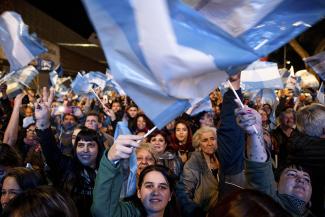Elections
New president, old problems

A preliminary presidential election was held in Argentina in August. The outcome was surprising: the incumbent, Mauricio Macri, lost decisively against Alberto Fernández of the Peronist party. Fernandez’ running mate is Macri’s predecessor, Cristina Fernández de Kirchner – popularly known as “Cristina” – and it was basically due to her many mistakes and scandals that Macri won the presidency four years ago.
Argentina is in a serious crisis once again, and that usually helps the opposition in an election. That is especially so if the majority of citizens are bearing the brunt. The relationship with the International Monetary Fund (IMF) as the country’s main creditor has become difficult, and it seems to be inevitable that the current government or its successor will have to restructure liabilities. At the same time, the national currency is depreciating fast. Macri has not offered any real solutions. He struggles merely to explain the countermeasures that his administration has taken. At times when no solution is in sight, slogans like “This is the only way” are simply not enough. Many middle-class voters have therefore backed off from Macri.
Meanwhile the opposition is re-interpreting history to its advantage. On the campaign trail, Fernández likes to say that Néstor Kirchner, another Peronist, pulled the country out of the 2001/02 crisis. Kirchner was Cristina’s husband and predecessor. He was in office from 2003 to 2007 and died in 2010. Fernández was his chief of staff.
Fernández’ version of Argentina’s most recent history conveniently skips three important issues:
- The mountain of debt that led to the 2001/02 crisis was amassed under Carlos Menem, a Peronist president.
- Néstor Kirchner came to power after Argentina had declared default and the economy couldn’t possibly get any worse. After default, moreover, he was no longer bound by IMF conditionalities (see my essay in the Focus section of D+C/E+Z e-Paper 2018/09).
- Under Néstor Kirchner, the economy flourished due to strong international demand for commodities, especially soybeans, but the favourable conditions were not used to start structural reforms.
Global commodity demand is currently weak, and under the government of Cristina inflation grew and economic growth stopped. As a consequence, Macri was forced to turn to the IMF once more. In response to its demands, he balanced the national budget, albeit at a high price: high foreign debt, lower wages for public servants and cuts to social services.
Argentina’s next government will face the same old problems: recession, inflation, foreign debt and great economic volatility. Together they add up to Argentina’s fundamental problem: the country is incapable of taking in enough money to cover its expenses. Néstor Kirchner made no significant progress in this regard. He only brought about temporary improvements in living conditions.
What is needed now is tax reform, pension reform and fresh momentum in the education sector. In order to accomplish that, Argentina will need a new understanding of the role of the state. However, conservatives like Macri always only want to reduce its size, while Peronists pretend it can pay for everything.
Argentina’s political system is dysfunctional. Since the introduction of democracy in 1983, only Peronist presidents have lasted an entire term in office. Their party is an instrument of power that always leaves its elected successors with such enormous problems that they are doomed to failure. The Peronists then use that failure to present themselves as the only legitimate political force. Macri will probably become the first non-Peronist president who has barely managed to complete a term in office. But he was doomed by what he inherited nonetheless.
For a long time, Fernández and Cristina were actually opponents. Now they have put their differences aside so they can rise to power again. Peronists must surely bare the blame for Argentina’s democratic era being marked by political instability and – even more – economic and social decline.
Nevertheless, people seem to want to give that party another chance. The big question is whether it is possible at all to change a dynamic that, in the eyes of the world, has made Argentina a country associated with decline.
Jorge Saborido is a consulting professor of history at the University of Buenos Aires.
jorge_saborido@hotmail.com







